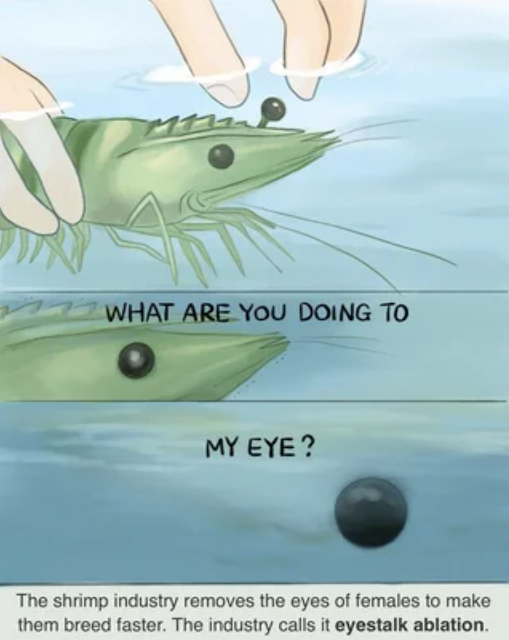"Eyestalk ablation is the removal of one (unilateral) or both (bilateral) eyestalks from a crustacean. It is routinely practiced on female shrimps (or female prawns) in almost every marine shrimp maturation or reproduction facility in the world, both research and commercial. The aim of ablation under these circumstances is to stimulate the female shrimp to develop mature ovaries and spawn.Most captive conditions for shrimp cause inhibitions in females that prevent them from developing mature ovaries. Even in conditions where a given species will develop ovaries and spawn in captivity, use of eyestalk ablation increases total egg production and increases the percentage of females in a given population that will participate in reproduction. Once females have been subjected to eyestalk ablation, complete ovarian development often ensues within as little as 3 to 10 days. The practice was a major development for the commercialisation of shrimp farming in the 1970s and 80s since it enabled reliable production..."
Image from the Interesting subreddit thread, where the discussion thread comments express surprise, dismay, and horror.

The things that we imagine evil aliens might do to us, we do all the time to other species.
ReplyDeleteI think we became "evil aliens" about 12,000 years ago when we ceased to be members and became masters in the community of life. Alienated by virtue of our subjugation of other life forms.
DeleteDo they then use the eyeballs for soup?
ReplyDeleteWould make for an interesting "fake roe".
DeleteIf we domesticate animals, there is, it seems, the moral imperative that we seek to do right by them. Yes, we may eat them, but we should not be cruel or uncaring. Even the Bible tells us that we are not to "muzzle the ox that treads the corn."
ReplyDeleteFor instance, if we have horses, there is not just the need to ensure they have food and water, but also that their hooves are taken care of, that they are cured or vaccinated from certain diseases.
Eating an animal is natural. Nature sets the example. Of course, nature can be quiet cruel. We all want the gazelle to cross the river before the crocodile can catch it, don't we?
If we are raising animals to eat them, it surely seems that it is immoral to treat them poorly and then end their lives. Of course, to treat them nice and end their lives might be even worse; after all, they may have been enjoying life, only to have it snatched from them.
Most hunting is not done for food, I dare say. It's done for fun. Yes, there are some folks back up in the sticks that might take down a deer, hog, or squirrel and eat it. Most of us don't. We have too much meat readily available to us.
Now, fishing is a different matter. My family has never fished purely for sport (although we enjoy it as much as any sports fisherman, I imagine). Our goal is not to mount something on the wall, but to put fish in the freezer (my dad doing the his super-fast fileting...and me cooking up the french fries, tater tots, onion rings, hushpuppies, and fish. I've done it hundreds of times...and after all these years (I'm now 62; my dad is 85), I think I might still be able to do a good job of it.
I figure if worse comes to worst, I can always get my fish cooker and cook up some fish dinners at, say $8 a plate...and make enough to get by. (Lord willing, anyway.)
Good comment. I find it grounded and practical. But we have an appeal to nature in the argument that "eating an animal is natural" and therefore morally sound. I would approach the question like this: Do we agree that inflicting suffering, unnecessarily, is wrong, evil, objectionable? If so, do we agree that most of the suffering inflicted on our fellow creatures is unnecessary? If so, we ought to cease from inflicting said suffering. In the modern world, it's not difficult to feed ourselves with plant foods. That is to say, it is unnecessary to do otherwise.
DeleteI would disagree about hunting. A lot of people I know hunt deer, ducks and other species because they like to eat the meat. And a lot of hunting is regulated by the states to control population, for example to prevent deer from getting sick or starving from overpopulation in an area.
DeleteI would feel bad about this, but then I remember 'shrimps is bugs' and I don't have any mercy for cockroaches, so therefore I don't have any for shrimps either.
ReplyDeleteOf course to be perfectly fair, I also don't eat shrimp anyway; it's a texture thing for me. So I suppose I neither personally support nor condemn this process.
The more we learn about our fellow creatures the more we realize how sensitive they are. But we have to be open to this learning. Next, to act as if it matters. I suppose cockroaches run from us because, on some level, whether we understand it or not, they desire to live. Why would I torture cockroaches by blinding them, especially when I really have no idea what they experience? Not to mention that conflating cockroaches and shrimp is another version of that red line between human life and all other life, where all other life falls below the line in one conflated category, without moral standing/interests. This kind of thinking leads to mindless infliction of suffering and, also, on a human-centric level, is the kind of thinking, or culture, that's at the root of humanity's ultimately self-destructive war on the living systems on which we utterly depend. We can't devalue any life without devaluing all life--including human life.
Delete